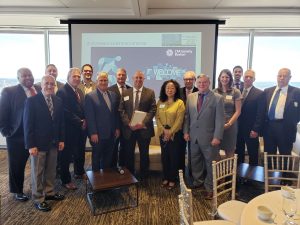With over 100 attendees filling the room, we were pleased – but not surprised – by the terrific turnout for our late June CFA Society of Boston Sustainable Investing Initiative event, Opportunity Zone Investing for the Impact Investor.
We had two goals for the program. We wanted to provide investment professionals information and insight help them assess the potential of Opportunity Zone investments for their impact-focused clients. Equally importantly, we wanted to fill a glaring need that we saw as we developed the program – creating conversations between investors and the municipal leaders working to generate the economic development that is the purpose of the Opportunity Zone program.
 We are grateful for the leadership of two of our presenters – Massachusetts Secretary of Housing & Economic Development Mike Kennealy and his immediate predecessor as Secretary, Jay Ash – for recruiting a diverse and distinguished group of Mayors to participate in these conversations.
We are grateful for the leadership of two of our presenters – Massachusetts Secretary of Housing & Economic Development Mike Kennealy and his immediate predecessor as Secretary, Jay Ash – for recruiting a diverse and distinguished group of Mayors to participate in these conversations.
The highlight of the morning was a lightning round of one-minute elevator pitches for the opportunity zones and economic development opportunities in more than a dozen Massachusetts cities. Most of these were delivered by the mayors themselves. Their leadership, commitment, focus, clarity and command of the issues was impressive. They would not have been out of place at a VC pitch event.
They inspired my top takeaway from the session:
Investors and funds who partner locally – with the municipalities, and with the property and business owners in the opportunity zones – will be the most likely to succeed financially and with economic impact.
That portion of the event reinforced and made very tangible what the audience heard from the speakers – Steve Kennedy (PWC), Elise Liberto (Brown Advisory), Mike Kennealy, Jay Ash, Matt Camp (ICIC), Marcos Marrero (City of Holyoke) and Laurent Hult (Bridgespan Group). Among the highlights from those conversations:
- Opportunity zone tax advantages flow from investing a capital gain in an opportunity zone fund. An investor has 180 days from the date of the capital gain to invest the proceeds into an opportunity zone fund. The message is clear – don’t wait until an impact-focused client asks about Opportunity Zone Investing to start your research.
- There are substantial reputational, financial and regulatory and financial risks if projects go wrong or fail to produce positive economic change in the community. Local engagement and a focus on impact in the community can mitigate those risks.
- Elise Liberto from Brown Advisory said that their extensive due diligence and experience to date has led them to conclude that leading with an impact framework is also the best way to drive financial return. Their early investments are demonstrating deal-level value add because entrepreneurs and property owners in the zones care about the integrity of their investors and are more eager to work with aligned investors.
- Using the opportunity zone vehicle won’t make a bad deal good, but it may help move a deal over the top. Estimates suggest a possible 1-3% boost to returns
- Local alignment is also helpful in taking advantage of state development incentives. In Massachusetts, the Mass Works program has invested $357 million over last 4 years for public infrastructure to facilitate private development. Municipal government, keenly focused on development that will improve their communities, is a key to accessing state programs.
- Here in Massachusetts, there are smart, focused and committed mayors and other municipal leaders prepared to facilitate and accelerate projects in their communities. Connect with these local leaders – they have the local knowledge to help investors make connections and they are motivated.
Based on what we as the organizers learned at the event and the feedback we received, the session succeeded in both providing actionable information on opportunity zones and starting some conversations for investors and municipalities. Speakers and participants both expressed their interest in expanding those conversations to a wider audience.
If you were not able to attend but are interested in learning more – and making connections with the municipal officials or speakers – please reach out.
